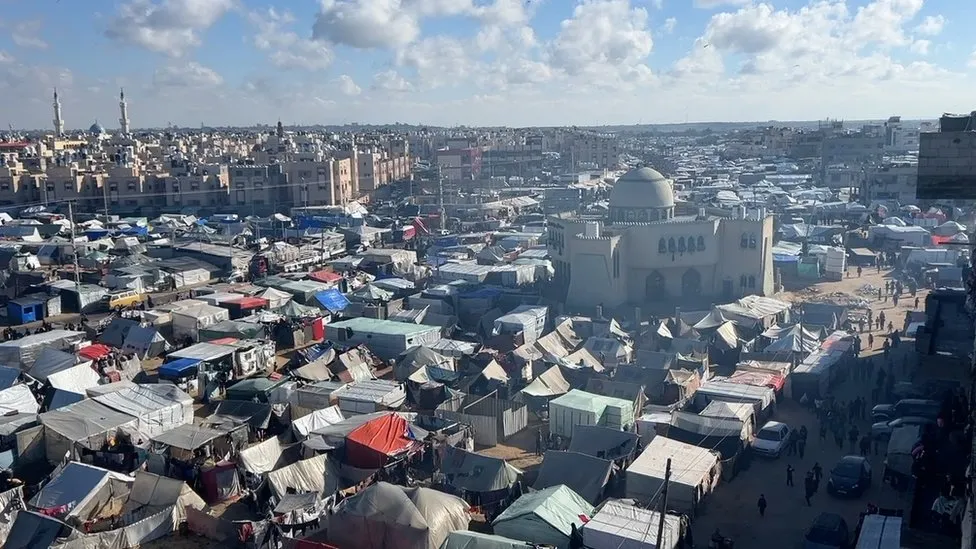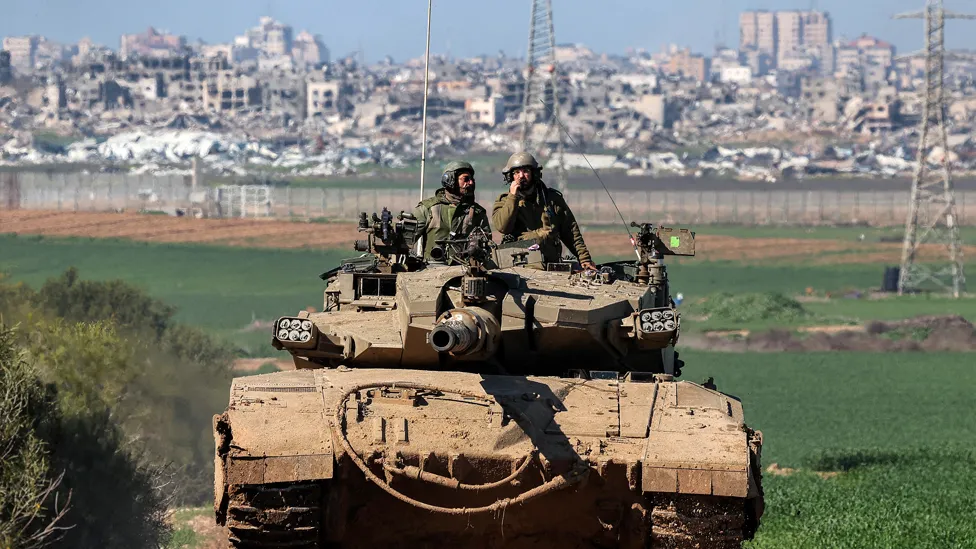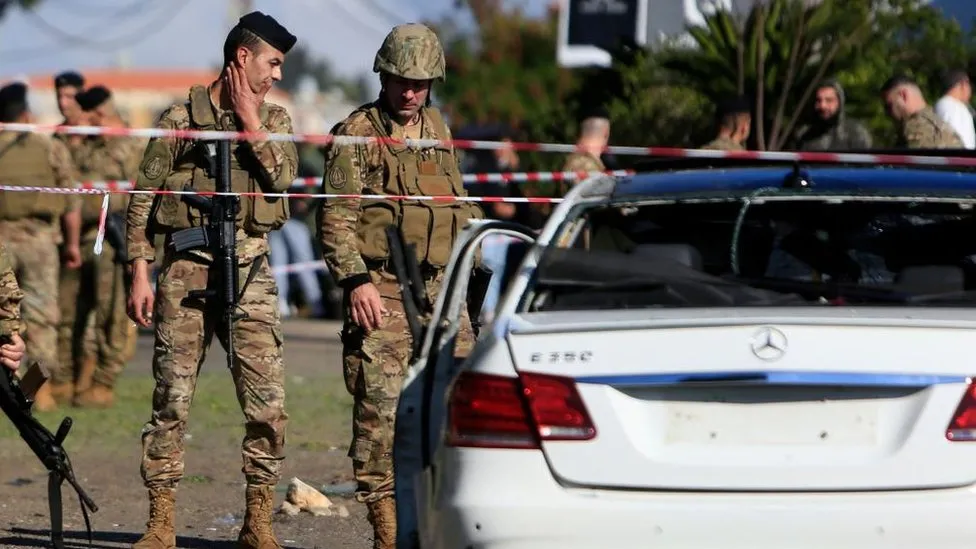I would rather write this story in the Gaza Strip, not Jerusalem. Having covered the war for many years, since El Salvador in 1989, I am convinced that nothing beats first-hand reporting.
Unfortunately, international journalists cannot do that in this terrible war. Israel and Egypt, the two countries that control Gaza's borders, don't want us there, independent reports say. Israel allows some closely supervised visits with its military. I only had one, back in November.
Since we can't get in, we rely on Palestinian journalists who can't get out. I greatly admire their courage and dedication to honest reporting.
Fortunately, it is impossible to stop war in the modern world. Because ordinary people can take pictures with a phone - and post their pictures online in a few clicks We can also talk to them if communication is not lost. Israel and Hamas upload their own videos. Everything must be verified and tested, especially now that artificial intelligence is so easy to use.
With all these limitations in mind, this is what the battle looked like on a February day from Jerusalem.
Humanitarian Crisis
Just after Hamas attacked Israel on 7 October, Israeli Defense Minister Yoav Galant announced: "We are under a total blockade of Gaza. No electricity, no food, no water, no gas - everything is off."
"We are at war with human beasts," he added, "and we are acting accordingly."
Under pressure from US President Joe Biden, Israel has now allowed limited supplies of food, water and medicine to Gaza. Aid agencies and the United Nations have cited substantial evidence that Israeli security checks slow the delivery of aid to Gaza and restrict the movement of aid vehicles inside the Israeli Strip. Very little medical and food aid has reached northern Gaza this year.
In response to this article, the Israeli embassy in London said that claims by UN agencies about the food situation in Gaza are false and "support for Hamas propaganda". Israel says that if aid is not forthcoming, it is because of the UN and aid agencies. The statement added that "Hamas steals aid from the residents of Gaza".
Law and order in Gaza has collapsed after four months of war. Relief vehicles are being looted every day. According to the United Nations, Sunday 11 February was the worst day of looting in the South. It said local police forces stopped protecting the convoy after eight of them were killed in an Israeli raid.
Since we are not allowed into Gaza, we cannot verify Israel's claim that Hamas is stealing food.
The main suspects in the United Nations are the criminal gangs that sell it. Judging by the few videos of looting that have surfaced, desperate people are doing it too.
"I don't know who they are," UN humanitarian coordinator Jamie McGoldrick told me. "They're young guys, not in uniform. They come in here and they stop us and take stuff from the back. And it's on the market sometimes. I don't mind if desperate people use it but you see some of the things on the market that our trucks Removed from." Mr McGoldrick said it was becoming impossible to operate in such a lawless environment.
Israel is increasingly sensitive to accusations that it is responsible for the suffering of Gazan civilians due to pressure from its allies, particularly the United States, and as it faces a genocide case at The Hague's International Court of Justice. Later this month, the court must demonstrate that it has improved the conditions of non-combatants in Gaza.
Innocent civilians in Gaza are being killed and injured, starving and denied medical treatment, international aid groups say. The Geneva Conventions state that punishing civilians for crimes amounts to collective punishment, which is a war crime.
The Americans have called on Israel since October 7 to respect the laws of war in Gaza, especially to stop killing so many Palestinian civilians. The fact that American officials, from President Biden on down, have repeated and reinforced their criticism shows that they believe Israel has ignored them.
On his visit here this week, US Secretary of State Anthony Blinken issued his harshest public criticism yet of Israel's handling of the war. He said the brutality of Hamas attacks on Israel cannot be used to justify atrocities against Palestinians.
"On October 7, Israelis were subjected to the most horrific dehumanization," he told a news conference in Tel Aviv. Since then hostages are being dehumanized every day. But it cannot be a license to dehumanize others.
"The vast majority of people in Gaza had nothing to do with the October 7 attack," Mr. Blinken said. "The families in Gaza whose survival depends on the distribution of aid from Israel are just like our families. They are mothers and fathers, sons and daughters, who want to live a good life, send their children to school, live a normal life. That's who they are. That's what they want."
Nevertheless, the United States has chosen not to attach conditions to its massive military and diplomatic support for Israel. It continues to supply weapons to Israel, even though it does not approve of the way they are being used.
Philippe Lazzarini, the commissioner general of UNRWA, the UN agency leading the humanitarian operation in Gaza, issued his own warning about the long-term consequences of the war for Gaza's youth when I spoke with him this week.
"I'm extremely worried," he said. "All of them have been deeply hurt by this unprecedented war. They are living in absolutely deplorable conditions. Now, when the war ends tomorrow, our first priority should be to find a way to get these children back into the education system... [or] we face more resentment and I will sow the seeds of hatred."
Israel will not be swayed by Mr Lazzarini's comments. It has made serious allegations against UNRWA, accusing it of aiding and abetting Hamas. Mr. Lazzarini has been fighting to save the organization since Israel presented a dossier to the Americans that nearly a dozen UNRWA workers took part in the Oct. 7 attack.
UNRWA has fired the accused and is trying to reassure the 16 major donor countries that have suspended its funding. Mr. Lazzarini said he takes the allegations very seriously, determined to root out Hamas sympathizers, but Israel has yet to provide him with the dossier sent to the United States. Israel believes that UNRWA is fundamentally rotten. The crisis surrounding the organization is undoubtedly another obstacle to aid operations.
Northern Gaza is virtually inaccessible to the United Nations and other aid agencies. As information emerges, local people living in the ruins report widespread starvation and widespread malnutrition among children that can have lifelong health consequences for survivors.
We get more information from southern Gaza, where two million people are trying to survive. About 1.4 million are in Rafah, the Egyptian border fortified against wire. Most people live in tents made of plastic sheets next to sewage ponds.
Unlike journalists, aid workers from organizations involved in relief operations can travel in and out of Gaza. I spoke with several UN officials who have decades of experience in war zones. Everyone said it was the worst they had ever seen. One told me: "I've never seen anything of this size and scale and depth."
Another said Gaza was the most dangerous and difficult place he had ever been, not just because of Israeli bombing but because of the breakdown of law and order. He said: "There are a lot of guns in Gaza, but also a lot of big angry people with clubs." The UN was moving aid convoys in the early hours of the morning to prevent looting.
War in Gaza
Palestinians in the city of Rafah have been panicking about a ground attack on the city by Israeli troops. A colleague from BBC Arabic spoke to Jaber al-Burdini, a middle-aged man in the town of Rafah, who had just dug out dead children from the rubble of a neighbour's house.
"If there had been an Israeli operation here, thousands of people would have died. Children are terrified and adults too. Look at the children. They can't sleep."
Mr Lazzarini told me that a major Israeli assault on Rafah would "add an extra all-out layer to the Gaza Strip".
He said about 5% of the population - about 100,000 people - had been killed, injured or disappeared in the past four months, possibly buried under the rubble.
"And then you have the rest of the population now concentrated almost in the open in Rafah. And then you launch a military operation into this place, you just add an extra catastrophic layer of tragedy. And that absolutely needs to be avoided."
Airstrikes in Rafah have already killed scores of people, but despite American calls for restraint, Israeli Prime Minister Benjamin Netanyahu said he had ordered the army to attack the city if plans were made to evacuate Palestinian civilians from Rafah. Since nowhere in Gaza is safe, residents are not getting that assurance. Perhaps Mr. Netanyahu is trying to sway Mr. Biden.
Another potential audience could be the International Court of Justice in The Hague, which has ruled that Israel faces "credible" allegations of genocide against Palestinians in Gaza.
Israel has set a high bar for victory that may be unattainable, even for many months. It seeks to wipe out Hamas, restore Israel's security, and release hostages held by Hamas on October 7. Many families of Israelis held captive in Gaza and their supporters are not buying the prime minister's argument that only force will free the hostages. They want an armistice agreement, because they fear that the longer the war lasts, the less likely they will meet again.
Israel has inflicted considerable damage on Hamas, but it has not broken its ability to fight. A senior Western intelligence official told me that Israel had killed about one-third of Hamas' forces and destroyed about one-third of the tunnel network that made Hamas such a formidable foe.
Mr Netanyahu also said Israel wanted to kill Hamas leaders, starting with Yahya Sinwar, who it believed instigated and directed the October 7 attack. So far, Mr. Sinwar and his closest lieutenants are believed to be alive, possibly living in a network of tunnels secured by Israeli hostages.
War in the wider Middle East
Four months in, the aftermath of the Gaza war has reverberated throughout the Middle East. Iran's network of allies, which it calls the Axis of Resistance, is engaged in a larger war.
After three US soldiers were killed in Jordan by a militia trained and financed by Iran, the US began a rotating program of airstrikes in Syria and Iraq. Along with the UK, it has bombed Houthis in Yemen who have been attacking ships in the Red Sea. US and Israeli hawks want the US military to bomb Iran.
The Houthis and Iran's other allies and proxies say they stand in solidarity with the Palestinians in Gaza. Iran's strongest ally is Lebanon's Hezbollah. Its border war with Israel is getting more serious and intense by the day. Pressure is mounting within Israel to send troops into southern Lebanon.
Americans are trying to pave the way for a peaceful future in the Middle East. Secretary of State Blinken laid out a vision for Saudi Arabia to normalize relations with Israel, if the Israelis would allow the Palestinians an independent state of their own. Prime Minister Netanyahu said, there will be no independence for Palestine. He insisted that Israel would continue until it achieved "total victory".
This war is ongoing and there is no prospect of an immediate ceasefire. The longer it goes on, the harder it will be to control the consequences of what is happening in Gaza.
- Huge push for Gaza aid - but little hope for those suffering
- Iran's sudden strikes show just how perilous region has become
- Tough choices for Israel in US's Middle East vision
- Huge challenges for Israel on its vague 'day after' Gaza plan
- Stakes are immense as Biden presses Israel to change course
- Hamas support soars in West Bank - but full uprising can still be avoided
- The status quo is smashed. The future is messy and dangerous
- Bowen: US sets clearer red lines for Israel as ceasefire ends
- When this truce ends, the decisive next phase of war begins
- What are routes out of this 'dangerous moment' in Middle East?










